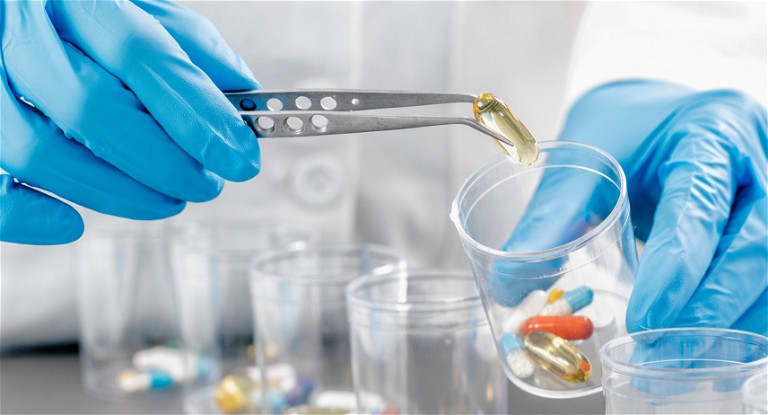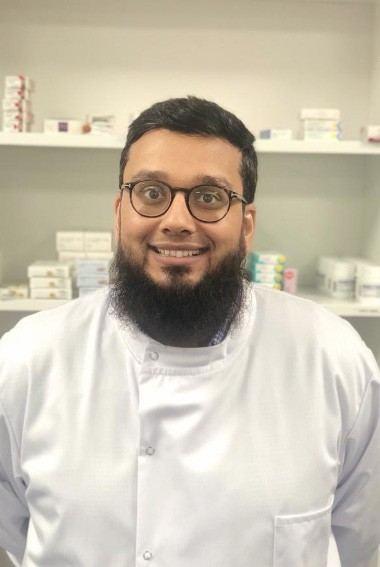Industry Insight

Compounded Medication: What Do We Need To Know?
Rizvan Faruk Batha from Specialist Pharmacy tells Pharmafocus about the history and benefits of compounded medication and why it’s not as common in the UK as the rest of Europe, North America and Australia

Put simply, compounding is the process by which one or more individual ingredients are combined to create an individually customised medicine, where the exact strength, dosage or form required by the patient is created in a tailor-made and unique manner. Compounding pharmacies can create medications in a variety of dosage formulations such as creams, capsules, suppositories and injectable solutions whilst also being able to adjust the dose or flavour of these medicines to create a combination that is not commercially available from pharmaceutical drug manufacturers.
The origins of pharmacy can be traced back to the Sumerians, Egyptians and Greeks; natural products derived from plants, animals and minerals were used, however the first recorded evidence of pharmaceutical methods dates back to around 2600BC in the Mesopotamian era.
The ancient Egyptians developed a sophisticated pharmacy system and from then on pharmacists and physicians have been able to compound medicines to treat a wide variety of ailments. By 1815, apothecaries in the UK became known as general practitioners (GPs); chemists and druggists (the modern day pharmacists) were left to manufacture, pack, wholesale, retail and dispense medicines. In 1841, the Pharmaceutical Society of Great Britain was formed, followed by the role of pharmacists and pharmacies being enshrined in law in 1868.
Before the advent of mass production of medications, pharmacists would routinely compound medications for their patients by hand, based on their specific needs. However, with the advent of mass-produced medications and the increasing regulation of the pharmaceutical industry, the practice of compounding began to decline.
The founding of the NHS in 1948 meant increased marketing and therefore awareness of these mass-produced medicines and pharmacists began to spend their time dispensing medication, rather than compounding. The NHS provides free or low-cost healthcare to all. Due to the nature of the NHS budget and the guidelines that follow that regulate which medicines are available through its services the need for compounded medicines started to decline.
Whilst mass manufacturing of medicines may meet the needs of the majority of patients, it’s important to recognise that up to 20% of all hospital admissions are medicine-related.1There remains a subset of patients who do not respond well to manufactured, mass-produced medicines, either due to allergies, sensitivity to one of the excipients or the formulation of the licensed medicine not being suitable for them. The very nature of mass manufacturing becomes a ‘one-size-fits-all’ approach, therefore the need for compounding still exists today.
There may also be clinical needs that cannot be met by a licensed medicinal product or a suitable alternative, and the risk of the patient not having treatment takes precedence over the potential risk of compounding the medicine. In addition, it can be necessary for a patient to have an exact dosage strength that does not currently exist as a licensed product. Rather than taking half a tablet or cutting a patch in half, where there is no certainty of dose, a pharmacist can compound the exact dose that is required for the patient. In these scenarios compounding pharmacies can work with healthcare providers and patients to ensure the specific needs of the patient can be met.
It is important that compounding pharmacies are subject to regulatory oversight and must adhere to strict quality standards to ensure the safety and effectiveness of their medications. In the UK, compounding pharmacies are regulated by the General Pharmaceutical Council (GPhC) and operate under the exemption of Section 10 of the Medicines Act 1968 and Regulation 4 of the Human Medicines Regulations 2012. Regulated compounding pharmacies with sufficient risk management and quality management systems allow a pharmacist to prepare and supply unlicensed medicines.
Pharmacists are experts in medicines and acquire the knowledge and expertise required to compound during their initial education prior to registration. The GPhC guidance explicitly mentions that patients would expect that ‘when an unlicensed medicine is prepared by, or under the supervision of, a pharmacist in a registered pharmacy, it is of an equivalent quality to any licensed medicine they will receive (such as those produced by a regulated and licensed manufacturer)’. Therefore, compounding pharmacies are expected to ensure that they can maintain these high standards and are regularly inspected by the GPhC.
Today, the UK has only a handful of compounding pharmacies, compared with Germany for example, which has over 2,000, so why are they less common in the UK than in many other countries in Europe, North America and Asia? There are several factors at play.
Each individual country has its own governance and attitude towards unlicensed medicine and this dictates its compounding landscape. Continuing with Germany as an example, historically it has not wanted to rely on imports, to prevent being caught out during the all-too-common shortages of licensed medication. Perhaps more significantly, it has always promoted patient choice, whether that be with complementary therapies or compounded medication. It is therefore mandatory for all pharmacies in Germany to fulfil both licensed and compounded prescriptions, highlighting its more patient-centric approach to healthcare.
Patient care in the UK on the other hand, is dominated and led by the NHS and its commissioning bodies. GPs rely heavily on commissioned pathways for the medications they prescribe to their patients, primarily based on a cost-benefit ratio, which helps them stay within their limited medicines budget, however it also means that patients seeking compounded medication often have to go private. This ultimately leads to health inequality as access to these treatments only becomes available to those who can afford it.
The benefits of compounded medication are numerous. It allows healthcare providers greater flexibility to change ingredients, dosage forms and customise medications to accommodate for patients’ allergies, preferences and compliance, ultimately leading to better patient treatment outcomes. Additionally, compounding allows for medicines to be made during shortages of licensed products. Recently in the UK we have heard news of shortages of antibiotics, hormone replacement therapy and other medicines. Compounding pharmacies are best placed to help during these times of shortages. Unfortunately, these benefits have not been fully realised in the UK.
Compounding of bioidentical hormones
Hormone imbalances affect many women at various points throughout their lifetime, particularly as they reach peri-menopause, typically from the age of 40. Healthcare providers may prescribe women synthetic or licensed body identical HRT, available on the NHS, or compounded bioidentical hormones, available from a compounding pharmacy. Compounded bioidentical hormones use the same raw powdered hormones that are used in body identical licensed HRT. The main difference is that they can be modified by being compounded into different strengths and formulations, based on the patient’s needs. They are a great option for patients who cannot tolerate conventional HRT, for various reasons such as allergies or the formulation not being suitable (such as an inability to swallow). Take Utrogestan as an example. This is a licensed bioidentical progesterone, which is available in one strength (100mg) and contains peanut oil. What alternative is there for patients with peanut allegies, who have an inability to swallow or who cannot tolerate such a high dose of progesterone? A compounding pharmacy can make bioidentical progesterone capsules without peanut oil, in a lower strength or in a cream or suspension. Each patient’s individual needs can be evaluated and an appropriate prescription prescribed by the healthcare professional. Additionally, compounding allows for pharmacies to make formulations of body identical hormones during periods of shortages to ensure that women are not left without any hormones.
How do compounded hormones differ from licensed body identical and synthetic hormones?
Bioidentical hormones simply refer to compounded hormones whose chemical structure is identical to our endogenous hormones and are derived from plant sources such as yams or soybeans. Body identical hormones are also bioidentical, however, they refer to licensed, mass-produced hormones. The terms bioidentical and body identical are interchangeable and refer to the same chemically identical hormones.
Synthetic hormones differ drastically in their chemical structure from our natural hormones. They are recognised as foreign to the body and do not fit the receptor sites in the same way as our endogenous hormones. They try to mimic the actions of our natural hormones; however, due to their inability to fit perfectly and the action of their metabolites are often associated with more side effects and potentially do not have the beneficial effects associated with endogenous or chemically identical hormones. For example progestins, such as medroxyprogesterone acetate (MPA) are a synthetic form of progesterone and have many side effects such as fluid retention, risk of depression, bloating and an increased risk of breast cancer.
How can compounded hormones be used successfully in personalised menopause care?
Personalised menopause care is multifaceted and does not always involve the use of medicines. Menopause care should be an ongoing process that involves regular monitoring and adjustment of treatment plans. A more holistic and functional approach is now appearing to be the gold standard of treatment taking into account diet, gut health, genetics and individual patient choice.
Bioidentical hormones can be successfully used in personalised menopause care by practitioners who have carried out an assessment of the patient’s symptoms and overall health, including blood tests, genetic tests, urine metabolite tests, a pelvic ultrasound scan and a mammogram (where appropriate). The healthcare practitioner can then write a prescription for the patient based on their individual needs and concerns, which may include a mix of licensed body identical and compounded bioidentical hormones and other treatments including lifestyle changes.
This protocol means that the practitioner has an understanding of the current hormone levels of the patient, how the patient’s body metabolises hormones, that the endometrium is not thickened and that the uterus, ovaries and breasts are healthy. The practitioner can then prescribe their patient with the lowest possible dose of hormones needed to manage their symptoms, while monitoring them at regular, given intervals. For example, a licensed body identical oestrogen patch may be the right dose and preferred route of administration for a patient, but they may require progesterone at 50mg in a cream form and testosterone in a cream form (there is currently no testosterone available on the NHS licensed for women), which would need to be compounded.
There is growing cognizance that patient choice and personalisation should be at the heart of healthcare treatment and by offering compounded hormone options, this concept is getting closer to realisation, although the economic disparities remain.
References:
1. The Pharmaceutical Journal, PJ, April 2011; 471:DOI:10.1211/PJ.2021.1.66383

Author bio:
Rizvan Faruk Batha is the superintendent pharmacist and director of operations at Specialist Pharmacy. With over 14 years of experience within the pharmacy sector, he has extensive experience from working within GMP facilities, quality assurance & quality control roles, clinical trials & research GCP and within many specialities as a clinical pharmacist. Rizvan’s broad experience and background of working in licensed and unlicensed MHRA facilities has led him to now manage and drive his team to successfully lead the compounding industry in the UK, increasing access to medicines for patients needing a more personalised approach to their therapy. Rizvan is currently working towards becoming a clinically enhanced pharmacist independent prescriber specialising in menopause with
King's College London.